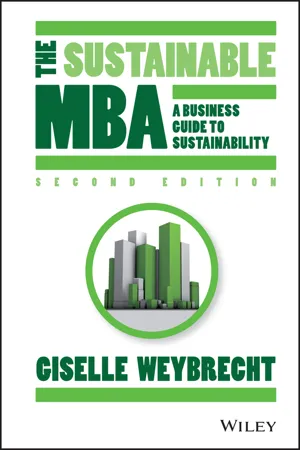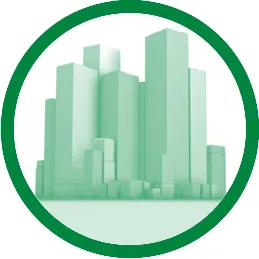
- English
- ePUB (mobile friendly)
- Available on iOS & Android
About this book
Whether you are an employee, a manager, an entrepreneur or a CEO, The Sustainable MBA Second Edition provides the knowledge and tools to help you 'green' your job and organization, to turn sustainability talk into action for the benefit of your bottom line and society as a whole.
Based on more than 150 interviews with experts in business, international organizations, NGOs and universities from around the world, this book brings together all the pieces of the business and sustainability puzzle including:
- What sustainability is, why you should be interested, how to get started, and what a sustainable organization looks like.
- A wide range of tools, guidelines, techniques and concepts that you can use to implement sustainability practices.
- Information on how to be a sustainability champion or intrapraneur in your organization including how to sell these ideas to your team and how to incorporate them into any job.
- A survey of the exciting trends in sustainable business happening around the world.
- A wealth of links to interesting resources for more information.
The Sustainable MBA Second Edition is organized like a business school course, allowing you easy access to the relevant information you need about sustainability as it relates to Accounting, Economics, Entrepreneurship, Ethics, Finance, Marketing, Organizational Behavior and HR, Operations and Strategy.
The Sustainable MBA Second Edition has been updated to reflect global developments in this evolving field to remain the definitive guide to sustainable business. Additional resources to accompany the book are available at www.thesustainablemba.com.
Frequently asked questions
- Essential is ideal for learners and professionals who enjoy exploring a wide range of subjects. Access the Essential Library with 800,000+ trusted titles and best-sellers across business, personal growth, and the humanities. Includes unlimited reading time and Standard Read Aloud voice.
- Complete: Perfect for advanced learners and researchers needing full, unrestricted access. Unlock 1.4M+ books across hundreds of subjects, including academic and specialized titles. The Complete Plan also includes advanced features like Premium Read Aloud and Research Assistant.
Please note we cannot support devices running on iOS 13 and Android 7 or earlier. Learn more about using the app.
Information
PART 1
SETTING THE SCENE

Chapter 1
About this Book

Who is The Sustainable MBA for and why should I read it?
- I am in a management position and need to better understand what sustainability is but don’t have the time to spend hours researching. I understand that I can make an impact through my work and my decisions, but am not sure how to.
- I am an entrepreneur and am interested in starting my own business and want to incorporate some sort of sustainability elements into it, either as part of my core offering or as part of the way I do business. I understand that sustainability provides a range of exciting new opportunities that I want to understand and explore.
- I am a CEO or board member and want to learn more about how I can move my business to be more sustainable. I understand that this is becoming the new business reality and that business success and sustainability are linked. I understand that in order to really move forward in this area, CEO leadership is required.
- I run or work for a small business and am overwhelmed by the amount of information out there on sustainability. I want to do something but am not sure what to do and where to start. I understand that I can tap into sustainability opportunities even with my limited budget and time and that these tools can help strengthen my overall business.
- I am an employee where my day-to-day job doesn’t currently have anything to do with sustainability, but I think it could, and I want to know how I can incorporate it into my job. Regardless, I understand that sustainability tools and strategies will increasingly become part of everyone’s day-to-day job and I want to understand what it is all about.
- I work in sustainability but mostly spend my time in one area and am not as familiar with everything else happening in this vast and growing field. My job rarely involves stepping back and thinking about the big picture.
- I am a teacher or a trainer and want to incorporate sustainability messages into my teaching lessons. I understand that if the new generation of employees and managers are aware of these issues, this could have a huge impact.
- I am a student and want to know more about this issue. I hope someday to be working for a company that takes sustainability seriously. I am passionate about these issues and want to make sure I direct that passion into an area where I can really make an impact.
- I am a consumer and want to make the right choices on a day-to-day basis. I understand that the products I buy help to support either good business practices or bad ones. I find it difficult to sort through quickly and easily and would like some help.
- I just want to know more about sustainability, but am overwhelmed by all the information out there and not sure where to begin.
What you will find in The Sustainable MBA
- An overview of sustainability tools. The book provides an overview of the work being done in sustainability. While sustainability is an interdisciplinary subject, the typical MBA, the typical business and employee expertise and training is still, for the most part, divided by functional areas. This is why the book is organized to follow the typical MBA.
- Business case. For every tool and idea introduced, the business case is presented to help you understand the advantages it could bring and to present a case to sell it to your team or managers.
- ‘How to’s and guides to implementation. The book does more than simply outline the tools and ideas involved in sustainability, it also provides information on how to implement them, with links to resources for more information and help.
- Challenges. The book outlines the challenges involved in pursuing different sustainability strategies in order to give managers a ‘heads up’ on what to expect. At the same time, the challenges presented act as a call to the next generation of corporate leaders to build their careers around tackling these problems.
- Knowledge from experts around the world. The book draws on a vast amount of information and research that has been undertaken in this area by groups internationally as well as over 150 interviews with students, professors, experts, thought leaders, businesses, CEOs, entrepreneurs, NGOs, and international organizations working and interested in this area.
- Tips for sustainability champions. Whether you are looking to be a sustainability champion at work or as a consumer, the book is filled with tips for individuals and teams who are looking to explore some of these tools, including handy lists and lessons learned. They build the case that sustainability and business profit and success are inextricably linked together, rather than diametrically opposed to one another.
- Many additional resources. Because the field of sustainability is a complex and changing field, the book contains many links to organizations and websites where you can find up-to-date information, statistics, best practice, and information. The focus is on international websites because they change less frequently, and because they often link to other national or local initiatives happening in countries around the world.
- Trends and new ideas. Last but not least, the book presents many exciting trends happening around the world in sustainability – things you want to keep an eye out for.
How The Sustainable MBA is organized
Table of contents
- Cover
- Contents
- Title
- Copyright
- Dedication
- Preface
- Acknowledgments
- Part I: Setting the Scene
- Part II: The Core Topics
- Part III: Tools
- Part IV: Wrapping It All Up
- Additional resources: Who, what, where, and how
- Index